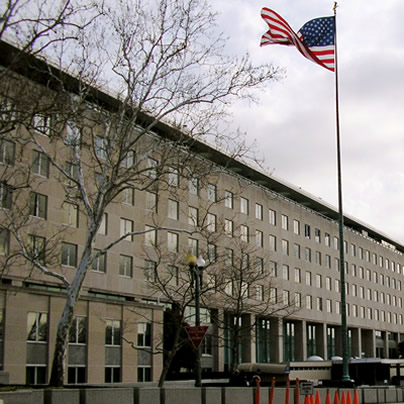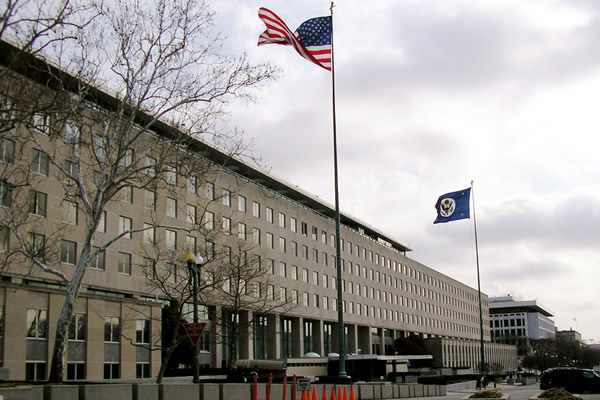News
State Department ‘trying to confirm’ arrest of Nigeria gays
Following signing of anti-LGBT law, AP reports ‘dozens’ arrested


The State Department says it’s looking into the veracity of reports that gay activists are being arrested in Nigeria. (Photo public domain)
The State Department is looking into media reports that authorities in Nigeria are arresting dozens of LGBT activists in the aftermath of passage of an anti-gay law in the country.
Under questioning from the Washington Blade, State Department Deputy Spokesperson Marie Harf said reports of arrests in Nigeria are “very troubling” if true.
“We’re trying to confirm those reports,” Harf said. “I’ve seen them. We don’t know if they’re true or not. If they are true, that would obviously be very troubling. Again, our team is continuing to check on the ground to get new facts to see what’s actually going on.”
According to a report on Tuesday from the Associated Press, human rights activists in Nigeria claim police are working off a list of 168 suspects — purportedly obtained through torture — to arrest dozens of gay men in the country. A police official reportedly denied any use of torture, and accounts of the number of arrests vary from as low as 11 to as high as 38.
Shawn Gaylord, advocacy counsel to Human Rights First, said the reports of arrests demonstrate the impact of the new anti-gay law in Nigeria, which was signed last week by Nigerian President Goodluck Jonathan.
“This is truly the worst case scenario,” Gaylord said. “When discriminatory bills like this are passed, we are always concerned that they set the stage for violence and ill treatment in society even when they are not enforced. But the fact that this law is being enforced so quickly and forcefully demonstrates the full extent of Nigeria’s human rights crisis.”
Under the new anti-gay law in Nigeria, same-sex marriage and same-sex “amorous relationships” are banned as well as membership in LGBT groups. The statute contains a provision allowing punishment of up to 14 years in prison for attempting to enter into a same-sex marriage.
After being unable to answer some questions from the podium on Monday for the Blade regarding the anti-gay law, Harf on Tuesday offered some answers.
For starters, after saying that passage of the law is inconsistent with Nigeria’s international legal obligations, Harf was able to identify which obligation the law violates: the International Covenant on Civil & Political Rights. Nigeria joined the 167-party agreement that aims to protect the civil and political rights of individuals in 1993.
“The Same Sex Marriage Prohibition Act not only prohibits same-sex marriage in Nigeria; it also includes broadly worded provisions implicating the rights to the freedoms of expression, peaceful assembly and association that are set forth in the ICCPR,” Harf said. “So, when we were talking about international law, that’s what we were referring to.”
Harf also clarified which U.S. officials spoke with officials in Nigeria prior to passage of the anti-gay law, saying they consisted of individuals at the U.S. Embassy in Abuja, the U.S. consulate general in Lagos and Washington officials. These officials, Harf said, helped Nigerians who support LGBT rights chart a course to “support the LGBT community there and to help Nigerians who are opposed to discrimination against the LGBT community.”
Still, Harf said she didn’t have an answer to a previous inquiry about whether U.S. officials had any knowledge that Jonathan would sign the legislation before he took that action.
Will Stevens, a State Department spokesperson, later said the U.S. government has been monitoring the legislation for some time.
“We have been closely monitoring the progress of this law as it moved through the legislative process and have engaged regularly with the [government of Nigeria] and civil society on our concerns about the proposed legislation,” Stevens said.
Additionally, Harf said she didn’t have any announcements about conversations the U.S. would have in the future about the Nigerian government on the anti-gay law, but said the administration would continue to voice concerns given the opportunity.
“One thing I learned to do is not make predictions from the podium about anything,” Harf said. “Like I said, I don’t have anything to announce about any conversations. We regularly raise it. I’ve been very clear from here about our position. If we have any updates, then I’m happy to let you know.”
Also on Tuesday, the United Nations High Commissioner for Human Rights Navi Pillay spoke out against the anti-gay law, marking the first statement against the statute by the intergovernmental organization.
“International human rights law and jurisprudence clearly indicate that states have a legal duty to protect all individuals from violations of their human rights, including on the basis of their sexual orientation,” Pillay said. “Disapproval of homosexuality by the majority on moral or religious grounds does not justify criminalizing or discriminating against LGBT persons.”
Pillay urged the high court in Nigeria to examine the constitutionality of the new law at the next opportunity.
For its part, Harf acknowledged the State Department is concerned that passage of the anti-gay law in Nigeria represents a growing trend of anti-gay activity in Africa.
“We are deeply concerned by some of the recent developments we have seen in Africa with respect to human rights of LGBT individuals, including passage of the ‘Anti-Homosexuality Bill’ by Uganda’s parliament and also increasing arrest of LGBT individuals in countries, such as Cameroon and Zambia,” Harf said. “Human rights are a cornerstone of our foreign policy; we say this all the time, and we will continue to support the efforts of our human defenders in Africa and across the globe who are working to end discrimination against LGBT persons.”
District of Columbia
D.C. Black Pride theme, performers announced at ‘Speakeasy’
Durand Bernarr to headline 2026 programming

The Center for Black Equity held its 2026 DC Black Pride Theme Reveal event at Union Stage on Monday. The evening, a “Speakeasy Happy Hour,” was hosted by Anthony Oakes and featured performances by Lolita Leopard and Keith Angelo. The Center for Black Equity organizes DC Black Pride.
Kenya Hutton, Center for Black Equity president and CEO, spoke following the performances by Leopard and Angelo. Hutton announced this year’s theme for DC Black Pride: “New Black Renaissance.”
Performers for 2026 DC Black Pride were announced to be Bang Garcon, Be Steadwell, Jay Columbus, Bennu Byrd, Rue Pratt and Akeem Woods.
Singer-songwriter Durand Bernarr was announced as the headliner for the 2026 festivities. Bernerr gave brief remarks through a video played on the screen at the stage.
DC Black Pride is scheduled for May 22-25. For more information on DC Black Pride, visit dcblackpride.org.
Virginia
Arlington LGBTQ bar Freddie’s celebrates 25th anniversary
Owner asks public to support D.C.-area gay bars

An overflowing crowd turned out Sunday night, March 1, for the 25th anniversary celebration of Freddie’s Beach Bar, the LGBTQ bar and restaurant located in the Crystal City section of Arlington, Va.
The celebration began as longtime patrons sitting at tables and at the bar ordered drinks, snacks, and full meals as several of Freddie’s well-known drag queens performed on a decorated stage.
Roland Watkins, an official with Equality NoVa, an LGBTQ advocacy organization based in the Northern Virginia areas of Arlington, Alexandria, and Fairfax County, next told the gathering about the history of Freddie’s Beach Bar and the role he said that owner Freddie Lutz has played in broadening the bar’s role into a community gathering place.
“Twenty-five years ago, opening a gay bar in Arlington was not a given,” Watkins told the crowd from the stage. “It took courage, convincing, and a deep belief that our community belongs openly, visibly, and proudly,” he said. “And that belief came from Freddie.”
Watkins and others familiar with Freddie’s noted that under Lutz’s leadership and support from his staff, Freddie’s provided support and a gathering place for LGBTQ organizations and a place where Virginia elected officials, and candidates running for public office, came to express their support for the LGBTQ community.
“Over the past 25 years, Freddie’s has become more than a bar,” Watkins said. “It has become a community maker.”
Lutz, who spoke next, said he was moved by the outpouring of support from long-time customers. “Thank you all so much for coming tonight and thank you all so much for your support over the past 25 years,” he said. “I can’t tell you how much that means to me and how much it’s kept me going.”
But Lutz then said Freddie’s, like many other D.C. area gay bars, continues to face economic hard times that he said began during the COVID pandemic. He noted that fewer customers are coming to Freddie’s in recent years, with a significant drop in patronage for his once lucrative weekend buffet brunches.
“So, I don’t want to be the daddy downer on my 25-year anniversary,” he said. “But this was actually the worst year we’ve ever had,” he added. “And I guess what I’m asking is please help us out. Not just me, but all the gay bars in the area.” He added, “I’m reaching out and I’m appealing to you not to forget the gay bars.”
Lutz received loud, prolonged applause, with many customers hugging him as he walked off the stage.

The Comings & Goings column is about sharing the professional successes of our community. We want to recognize those landing new jobs, new clients for their business, joining boards of organizations and other achievements. Please share your successes with us at [email protected].
Congratulations to Gil Pontes III on his recent appointment to the Financial Advisory Board for the City of Wilton Manors, Fla. Upon being appointed he said, “I’m honored to join the Financial Advisory Board for the City of Wilton Manors at such an important moment for our community. In my role as Executive Director of the NextGen Chamber of Commerce, I spend much of my time focused on economic growth, fiscal sustainability, and the long-term competitiveness of emerging business leaders. I look forward to bringing that perspective to Wilton Manors — helping ensure responsible stewardship of public resources while supporting a vibrant, inclusive local economy.”
Pontes is a nonprofit executive with years of development, operations, budget, management, and strategic planning experience in 501(c)(3), 501(c)(4), and political organizations. Pontes is currently executive director of NextGen, Chamber of Commerce. NextGen Chamber’s mission is to “empower emerging business leaders by generating insights, encouraging engagement, and nurturing leadership development to shape the future economy.” Prior to that he served as managing director of The Nora Project, and director of development also at The Nora Project. He has held a number of other positions including Major Gifts Officer, Thundermist Health Center, and has worked in both real estate and banking including as Business Solutions Adviser, Ironwood Financial. For three years he was a Selectman, Town of Berkley, Mass. In that role, he managed HR and general governance for town government. There were 200+ staff and 6,500 constituents. He balanced a $20,000,000 budget annually, established an Economic Development Committee, and hired the first town administrator.
Pontes earned his bachelor’s degree in political science from the University of Massachusetts, Dartmouth.
-

 District of Columbia5 days ago
District of Columbia5 days agoCapital Pride board member resigns, alleges failure to address ‘sexual misconduct’
-

 India4 days ago
India4 days agoActivists push for better counting of transgender Indians in 2026 Census
-

 Advice4 days ago
Advice4 days agoDry January has isolated me from my friends
-

 District of Columbia4 days ago
District of Columbia4 days agoCapital Pride reveals 2026 theme



















